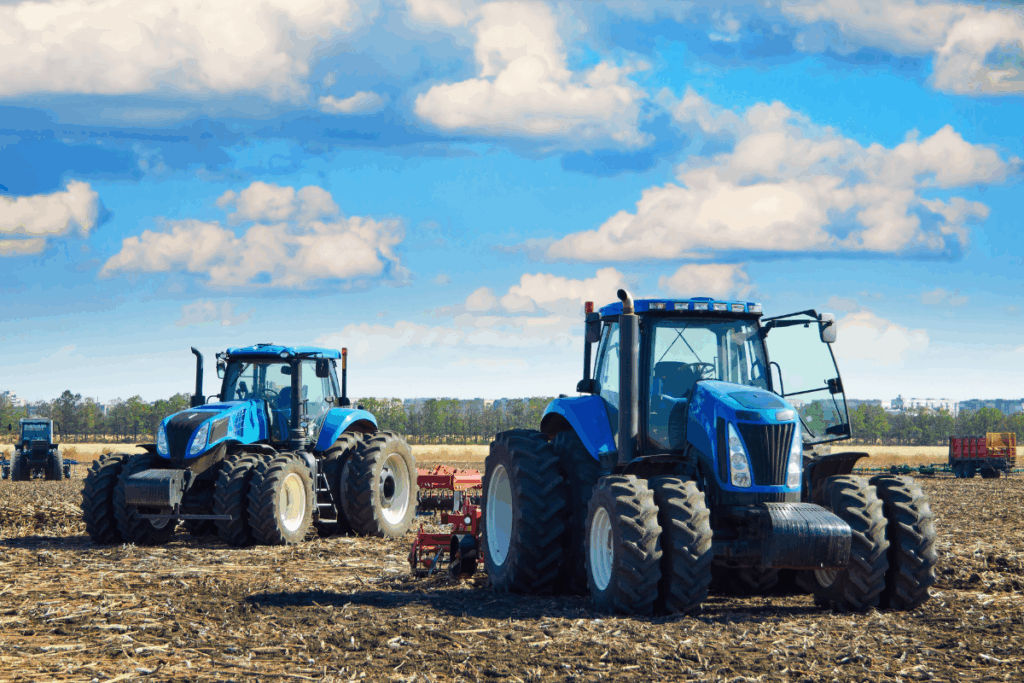High-quality agricultural vehicles need to do more than just maneuver across rough terrain. They’re also required to power, lift, and control the implements that support modern farming applications.
Three specialized systems in particular, the power take-off (PTO), hitch control, and hydraulics, allow vehicle users to perform their tasks with efficiency and precision. As a result, they must be fabricated to operate reliably while withstanding punishing duty cycles, seasonal extremes, and decades of use in the field.
In this month’s blog, we take a look at the unique fabrication considerations for each of these three systems and explore how they are central to reliable agricultural vehicle performance.
Power Take-Off Systems (PTO)
PTO components deliver rotational energy from the engine to external implements such as balers, augers, and mowers. Without a properly manufactured PTO, your agricultural vehicle’s ability to carry out tasks efficiently is compromised.
Optimal PTO fabrication starts with the material selection. Engineers typically select high-strength alloy steels for the unit’s shafts as they help balance torsional rigidity with shock resistance. Surface hardening treatments, such as induction hardening, help resist spline wear and extend the component’s service life under continuous load.
PTO housing assemblies require strong, durable welds, accurate micron-level tolerances, and tight fits to maintain shaft alignment under fluctuating torque loads, ensuring smooth integration with other instruments and preventing fretting corrosion.
Agricultural parts and equipment are constantly exposed to agricultural chemicals, fertilizers, and organic debris, which can quickly degrade untreated metal. To help prevent premature corrosion and wear, fabricators use advanced coating solutions that protect the metal from virtually any foreign element that could impact performance.
Hitch Control Systems
Most modern agricultural vehicles use a three-point hitch system that allows operators an efficient, standardized method of attaching and controlling implements. These systems must be built with quality materials and precision fabricators that enable them to safely manage thousands of pounds of dynamic load while maintaining positional accuracy.
Structural arms and linkages should be fabricated from high-strength, low-alloy steels as they provide excellent fatigue resistance and can easily absorb repetitive stresses from plowing, tilling, or seeding. Modern precision machining facilities use CNC laser cutting and robotic welding technologies to help ensure repeatable, distortion-free joints that can withstand extreme loads without becoming cracked or damaged.
Tight tolerances also play a role in fabricating hitch control system mounting points, bushings, and pins to avoid excessive play that could compromise implement stability and operator control. Furthermore, because these parts are subject to high-friction contact, surface treatments such as phosphate coatings are applied to protect against early wear.
Engineers should also design hitch assemblies to allow for quick pin replacements or bushing swaps without requiring complete disassembly in the field, reducing downtime for operators.
Hydraulic Systems
Hydraulic systems power everything from loaders and sprayers to precision seeders. Their integral role in agricultural applications means fabricators must build them for quality, reliability, and longevity, as hydraulic failures can result in reduced productivity.
Cylinder barrels, pistons, and rods must be machined with exacting precision to maintain pressure integrity under fluctuating loads. Alloy steels with chrome-plated finishes are the preferred choice for rods due to their ability to resist corrosion and scoring from abrasive contaminants. Weld quality in end caps and fittings is also essential to the parts’ reliability, as even hairline cracks can lead to leaks and system failure.
Sealing surfaces require ultra-smooth finishes achieved through precision grinding to prevent leakage at high pressures. Hydraulic manifolds, often fabricated from ductile iron or high-strength steel, must be machined with internal passages free from burrs or surface defects to prevent particle generation that could contaminate the fluid system.
Fabricators should also apply protective coatings to the hydraulic components to protect against damage from the wet, dusty, and chemically aggressive environments that agricultural vehicles typically operate in.
Read More: Inside AOR’s Complete Fabrication Process
Partner With Arrow Off-Road, Proven Experts In Agricultural CNC Manufacturing
Leading OEMs in agriculture, construction, defence, mining, and other industries rely on the design, fabrication, and assembly engineers at Arrow Off-Road to provide high-quality parts and components that prioritize reliability, performance, and durability under pressure.
With over 100 years of trusted metalworking experience using advanced technology operated by trained and qualified talent, we’re the only manufacturing partners you’ll ever need for high-quality off-road products that exceed your expectations, every time.
Arrow Off-Road: CNC Machine Manufacturers In Canada Delivering Quality To Global OEMs
Partner with Arrow Off-Road for precise machining, welding, and fabrication solutions customized to your requirements and application. Quickly request a quote for your next project to experience the Arrow difference in quality, precision, and service for yourself. Get in touch with us today!
